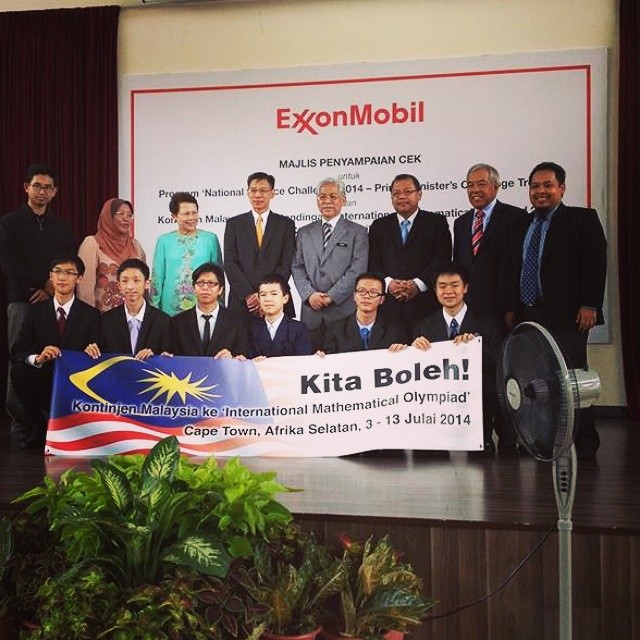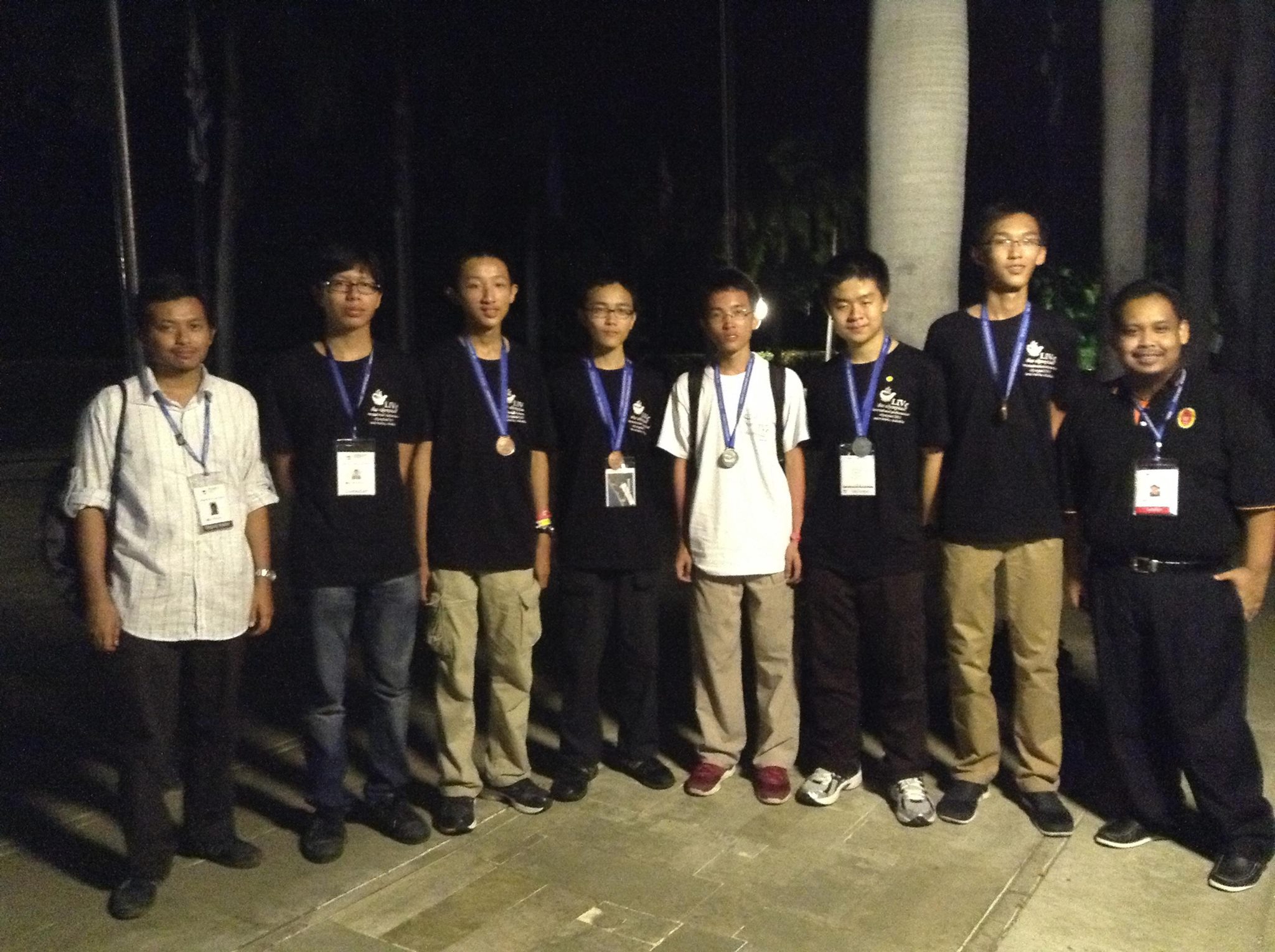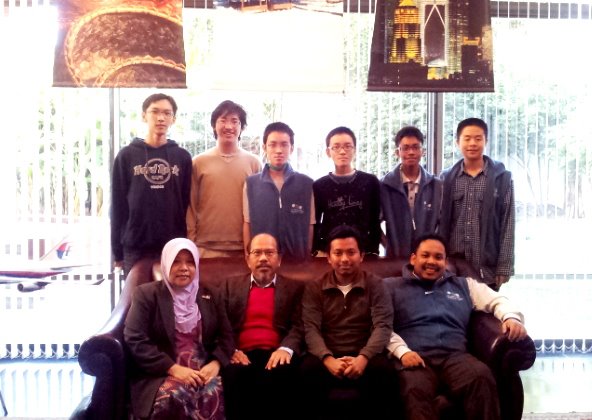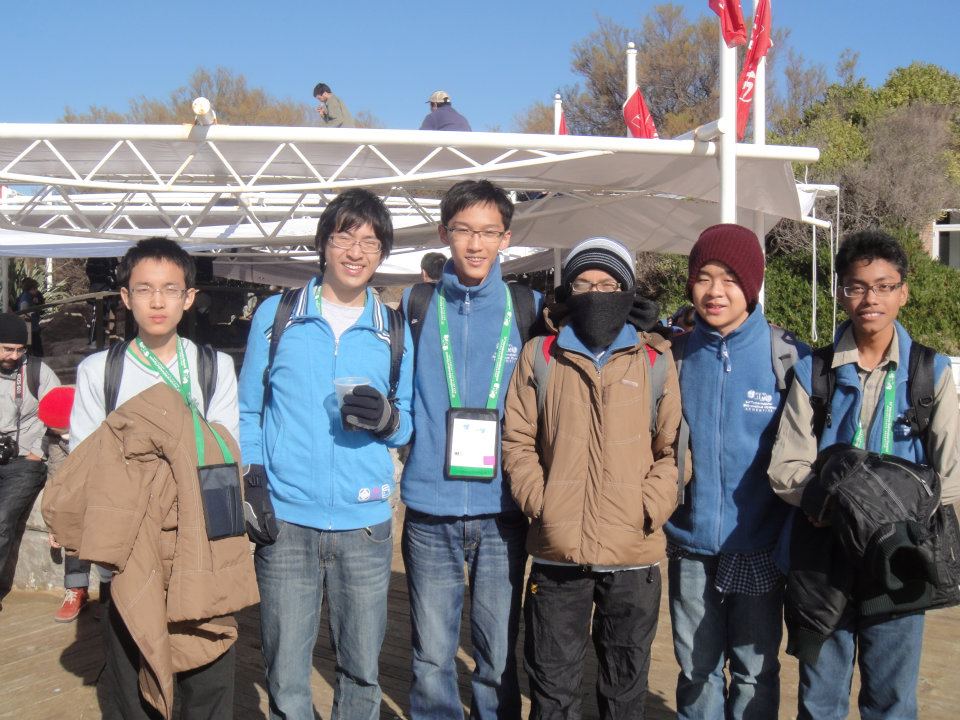Photos from the IMO
IMO 2014 South Africa

IMO 2013 Colombia

IMO 2012 Argentina



I was a Malaysian representative to the International Mathematical Olympiad from years 2011 to 2014. Below are my results in the Olympiad over my four participations:
| Year | P1 | P2 | P3 | P4 | P5 | P6 | Total | Ranking | Award |
|---|---|---|---|---|---|---|---|---|---|
| 2014 | 7 | 7 | 1 | 7 | 7 | 0 | 29 | 40/560 | Gold medal |
| 2013 | 7 | 7 | 0 | 7 | 7 | 0 | 28 | 61/527 | Silver medal |
| 2012 | 7 | 7 | 0 | 7 | 0 | 0 | 21 | 112/547 | Silver medal |
| 2011 | 7 | 0 | 0 | 1 | 2 | 0 | 10 | 356/563 | Honourable mention |
| Total | 28 | 21 | 1 | 22 | 16 | 0 | 88 | 1G, 2S, 1HM |
My achievement aforementioned managed to place me on the top of Malaysian's IMO hall of fame, tied with another contestant How Si Yu.
Below is the ranking of my home country Malaysia during the four years of my participation:
| Year | P1 | P2 | P3 | P4 | P5 | P6 | Total | Ranking | Award count |
|---|---|---|---|---|---|---|---|---|---|
| 2014 | 42 | 32 | 8 | 37 | 10 | 0 | 129 | 23/101 | 2G, 1S, 1B, 2HM |
| 2013 | 37 | 23 | 0 | 40 | 16 | 1 | 117 | 31/97 | 2S, 3B |
| 2012 | 42 | 7 | 0 | 24 | 24 | 3 | 100 | 35/100 | 2S, 3B, 1HM |
| 2011 | 37 | 0 | 10 | 25 | 19 | 2 | 93 | 41/101 | 1G, 1S, 1B, 2HM |
Each year, Malaysia sends six students to compete in the world's most prestigious high school mathematical championship. The students are selection from a sea of about 10000 contestants through the following timeline:





The ultimate goal for me is to write up some memorable moments throughout my four years. (I had my IMO 2014 story written here.) To start with, I will post an essay submitted to my Commonapp application that marked my improvement from IMO 2011 to IMO 2012, one of the pivotal moments for me. Happy reading! :)
“Hooray!” I leaped exuberantly when I had secured a place in the six-member Malaysian team to the 2011 IMO after series of selection. As this feat required me to unseat most competitors with knowledge and experience superior to mine, it was unexpected.
After solving various contest problems and doing our utmost in learning from trainers and teammates during training sessions, we were given Malaysian flags by the Minister of Education. This symbol of the colossal responsibility to perform well and uphold Malaysia’s name reinforced my aim in securing a bronze medal—an impressive adventure for first-timers.
We entered the contest hall twice, spirits highly motivated. Unfortunately, all three problems in the second paper confounded me completely: the general solution of the case-by-case analysis in the first problem looked impenetrable. However adamant my mind was on my original approach, the key ideas remained conundrum, ruffling my composure on deciding any alternative ways. One hour, 30 minutes, 10 minutes……I felt the heat spreading through my body with heart pounding fast, impeding my mind from functioning optimally. “Beep”! Time was called, and I submitted three rudimentary sets of work before exiting dejectedly.
The next few days were excursions, but my crestfallen mood eclipsed my enjoyment. With a paltry Honourable Mention, I couldn’t get over the humiliation when looking at medalists ascending the stage, waving their flags proudly.
“It’s all right, let’s fight again next year,” my coach consoled me. This motivated me to review my previous preparations.
In retrospect, I should have controlled my excessive obsession in spending hours to solve mathematical problems that blindfolded me from the knowledge gap between mine and that required. My teammates rhapsodized on techniques they used to solve those practice test problems like harmonic conjugates, while I confined myself to elementary methods like angle chasing. When one senior teammate hooked others’ attention with advanced topics that were powerful to solve some difficult problems, I nodded my head without any idea on their content. This necessitated a change in my subsequent preparations; otherwise, I might even lose a spot in the following IMOs.
With my strong desire to master the Olympiad, I stopped grieving over the first IMO and moved forward. Once again, I made my hands dirty with the algebraic equations in various contests, but now supplemented myself with knowledge from online portals like “Art of Problem Solving” and Canadian IMO Training Website. Some books like “Problems from the Book” by Titu Andreescu were also perused, and I actively engaged in discussions with other senior campers in clearing my doubts on abstruse concepts and convoluted theorem statements. The depth of these materials made the whole process difficult, but with growing mathematical passion I managed to drive myself through. I also foresaw the benefit of familiarizing myself with these advanced topics: only by incorporating this knowledge into problem solving could I elevate my subsequent performance.
As I enjoyed this realm of theorem- and trick-hunting, I suddenly felt as if the solutions to those previously inscrutable problems were unlocked automatically: I was on the right track! This, along with my pleasing leap in overall performance in IMO training camps, motivated me to spend even more time in exploring endless seas of mathematical complexities. Being able to solve most IMO problems of intermediate level comfortably, I told myself that I was ready for a silver medal in IMO 2012, given this one year of hard work. Indeed, I did it.
My initial disappointment taught me to overcome my downcast upon subsequent failures and move forward optimistically, which explained why these failures could hardly defeat me emotionally. I also learned to step back, constantly evaluate my strengths and weaknesses, and continuously put in more effort in everything I do. These led me to achieve my ultimate goal of winning a gold medal in IMO 2014. With these attitudes, I believe I will succeed in accomplishing my aspirations.